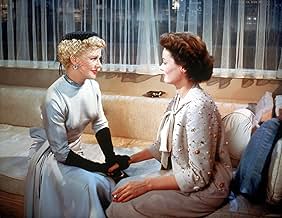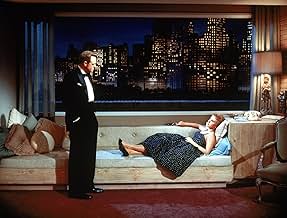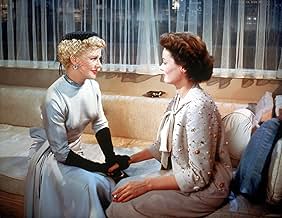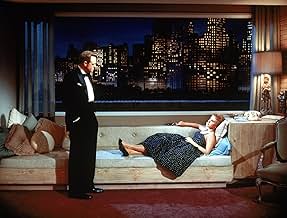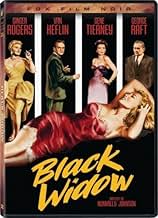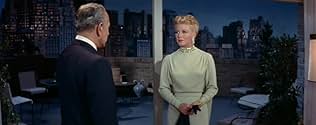PUNTUACIÓN EN IMDb
6,7/10
3,4 mil
TU PUNTUACIÓN
Una joven escritora comienza a entrar en la vida de un productor de Broadway.Una joven escritora comienza a entrar en la vida de un productor de Broadway.Una joven escritora comienza a entrar en la vida de un productor de Broadway.
Mabel Albertson
- Sylvia
- (sin acreditar)
Edward Astran
- Party Guest
- (sin acreditar)
Bea Benaderet
- Mrs. Franklin Walsh
- (sin acreditar)
Mary Benoit
- Party Guest
- (sin acreditar)
Nesdon Booth
- Police A.P.B. Man
- (sin acreditar)
Paul Bradley
- Party Guest
- (sin acreditar)
Steve Carruthers
- Party Guest
- (sin acreditar)
Argumento
¿Sabías que...?
- CuriosidadesNunnally Johnson originally offered the role played by Ginger Rogers to Tallulah Bankhead, who called the writer-producer and, in a 25-minute phone conversation, gave him her reasons for rejecting the role. Rogers turned the part down as well, but had a change of heart after Johnson sent her a letter asking her to reconsider, on the proviso that she could take the relatively minor role and make it into a star-turn.
- PifiasIf you listen carefully for changes in presence, it appears that some of Van Heflin's dialogue was looped in post production.
- Citas
[opening narration]
Peter Denver: The Black Widow, deadliest of all spiders, earned its dark title through its deplorable practice of devouring its mate.
- Créditos adicionalesOpening credits are shown over the background of a spider web made by a black widow.
- ConexionesFeatured in Ginger Rogers at Twentieth Century Fox (2007)
- Banda sonoraTheme from 'Dance of the Seven Veils'
from "Salome"
by Richard Strauss
[Played occasionally throughout the picture]
Reseña destacada
No matter how pretentious the cocktail party, never escape by asking another wallflower out for dinner. That was theatrical producer Van Heflin's mistake when, on the terrace of Broadway diva Ginger Rogers' apartment, he took pity on hopeful young writer Peggy Ann Garner. Just a few months later, she was found hanged in the bathroom of his apartment.
It was all very innocent, though. While his wife, another star on the Rialto (Gene Tierney), was away tending to her ailing mother, Heflin let Garner use his place as a daytime office so she could write in quiet comfort. (Well, not so quiet: She listens to `The Dance of the Seven Veils' from Salome incessantly and fixates on a line from the opera: `The mystery of love is stronger than the mystery of death.') But when it turns out not only that she was pregnant but that she was murdered, the police sensibly enough find in Heflin their prime suspect.
Black Widow, written and directed by Nunnally Johnson, assembles an impressive array of Hollywood luminaries across whose resumés long shadows were beginning to creep. Along with Rogers, Tierney and Heflin, there's George Raft as a police detective, Otto Krueger as Garner's actor uncle and Reginald Gardiner as Rogers' whipped spouse. It's an ensemble-cast, 40s-high-style mystery movie, made about a decade too late but not too much the worse for that (even allowing for its color and Cinemascope).
Heflin's technically the center of the movie the patsy racing around to prove his innocence. But the meatier parts go to the women, except for Tierney, all but wasted in the recessive role of the elegant but dutiful wife. Garner makes her abrupt exit early in the movie, but returns in startlingly revisionist flashbacks. And, as the grande dame (named `Carlotta,' perhaps in homage to another grande dame of the stage, Marie Dressler's Carlotta Vance in Dinner at Eight?), Rogers strides around in big-ticket outfits and fakes a highfalutin drama-queen accent. For most of the movie it seems like ill-fitting role for the essentially proletarian Rogers, but it's shrewdly written, and near the end she shows her true colors, becoming, briefly, sensational.
Like Repeat Performance and All About Eve, Black Widow uncoils in a high-strung, back-stabbing theatrical milieu that's now all but vanished all the money and the glamour have moved west. (Not to put too fine a point on it, but the tiny part of a struggling Greenwich Village actor is taken by television producer Aaron Spelling, now one of the richest men in Hollywood.) The movie cheats a little by withholding information essential to our reading of the characters, but it's a forgivable feint; the characters are all `types' anyhow. There is, however, one baffling omission there's not a single widow in the plot.
It was all very innocent, though. While his wife, another star on the Rialto (Gene Tierney), was away tending to her ailing mother, Heflin let Garner use his place as a daytime office so she could write in quiet comfort. (Well, not so quiet: She listens to `The Dance of the Seven Veils' from Salome incessantly and fixates on a line from the opera: `The mystery of love is stronger than the mystery of death.') But when it turns out not only that she was pregnant but that she was murdered, the police sensibly enough find in Heflin their prime suspect.
Black Widow, written and directed by Nunnally Johnson, assembles an impressive array of Hollywood luminaries across whose resumés long shadows were beginning to creep. Along with Rogers, Tierney and Heflin, there's George Raft as a police detective, Otto Krueger as Garner's actor uncle and Reginald Gardiner as Rogers' whipped spouse. It's an ensemble-cast, 40s-high-style mystery movie, made about a decade too late but not too much the worse for that (even allowing for its color and Cinemascope).
Heflin's technically the center of the movie the patsy racing around to prove his innocence. But the meatier parts go to the women, except for Tierney, all but wasted in the recessive role of the elegant but dutiful wife. Garner makes her abrupt exit early in the movie, but returns in startlingly revisionist flashbacks. And, as the grande dame (named `Carlotta,' perhaps in homage to another grande dame of the stage, Marie Dressler's Carlotta Vance in Dinner at Eight?), Rogers strides around in big-ticket outfits and fakes a highfalutin drama-queen accent. For most of the movie it seems like ill-fitting role for the essentially proletarian Rogers, but it's shrewdly written, and near the end she shows her true colors, becoming, briefly, sensational.
Like Repeat Performance and All About Eve, Black Widow uncoils in a high-strung, back-stabbing theatrical milieu that's now all but vanished all the money and the glamour have moved west. (Not to put too fine a point on it, but the tiny part of a struggling Greenwich Village actor is taken by television producer Aaron Spelling, now one of the richest men in Hollywood.) The movie cheats a little by withholding information essential to our reading of the characters, but it's a forgivable feint; the characters are all `types' anyhow. There is, however, one baffling omission there's not a single widow in the plot.
- bmacv
- 5 oct 2003
- Enlace permanente
Selecciones populares
Inicia sesión para calificar y añadir a tu lista para recibir recomendaciones personalizadas
- How long is Black Widow?Con tecnología de Alexa
Detalles
- Fecha de lanzamiento
- País de origen
- Idioma
- Títulos en diferentes países
- Black Widow
- Localizaciones del rodaje
- 1515 Broadway, Manhattan, Nueva York, Nueva York, Estados Unidos(Hotel Astor exterior near Times Square)
- Empresa productora
- Ver más compañías en los créditos en IMDbPro
Taquilla
- Presupuesto
- 1.095.000 US$ (estimación)
- Duración1 hora 35 minutos
- Color
- Relación de aspecto
- 2.55 : 1
Contribuir a esta página
Sugerir un cambio o añadir el contenido que falta

Principal laguna de datos
By what name was La viuda negra (1954) officially released in India in English?
Responde

